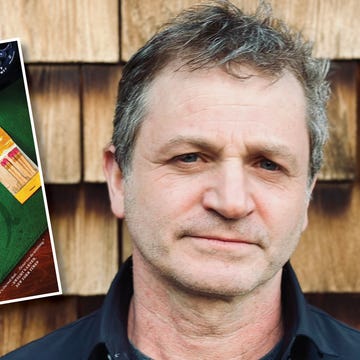Tourists who spot a black bear around the Lake Tahoe region might feel lucky, but these (admittedly adorable) creatures are wreaking havoc on many of their human neighbors. A fatality and an increased number of home invasions and attacks have raised the stakes—just in time for spring, when hibernation ends. Author and former National Park Service ranger Jordan Fisher Smith wrote about the battle over what to do about Lake Tahoe’s bears for Alta Journal’s Issue 31. His article is a riveting read on the collision of people flocking to one of the Golden State’s most popular locales and the hungry bears who devour their food, destroying property and occasionally harming people along the way. Join Alta Live as we welcome Smith for a deeper look into the issue, hear the many sides of this important story, and learn more about the plight of Tahoe’s black bears—and the people who can’t stop feeding them, despite their best efforts.
About the guest:
Jordan Fisher Smith grew up on Mount Tamalpais in a remodeled shack his parents, who were avid hikers, bought in 1953 from the fire lookout on the East Peak. Inspired by boyhood rambles on the mountain, in Muir Woods, and the Sierra Nevada, Smith spent 21 years as a ranger for the Forest Service, National Park Service, and California State parks in California, Wyoming, Idaho, and Alaska. During this time he began writing for magazines. Houghton Mifflin published his first book, the ranger memoir Nature Noir, a San Francisco Chronicle Best Books selection that the New York Times called “eloquently meditative.” His second book, the bear attack courtroom drama Engineering Eden, won a California Book Award and was longlisted for the PEN/E.O. Wilson Award for Literary Science Writing. The Wall Street Journal called Engineering Eden “intensely reported, rousingly readable and ambitiously envisioned.” Smith has also written for the New Yorker, Men’s Journal, Aeon, Discover, and Orion, and his magazine work has been nominated for awards from the American Society of Magazine Editors and the American Association for the Advancement of Science. Smith is a principal cast member and narrator of the film “Under Our Skin,” which was shortlisted for the 2010 Oscar for Best Documentary Feature. He lives in Nevada City.
Here are some notable quotes from today’s event:
- On why bears break into homes: “Bears can get fat on garbage just from the leftovers that we throw out. Why would a bear want to struggle, to dig up a ground squirrel den or dig up a root in the spring when they could get through a sliding glass door into a kitchen and tear apart a refrigerator?”
- On bear behavior: “They have a lot of what we’d call behavioral plasticity, meaning they can change what they do based on what we do. We’re so intermingled, the two species living on the same piece of ground. And essentially, bears naturally regard people as dominant bears. A bear that hasn’t had a lot to do with people will run from a human being, but they can be convinced not to by any kind of food reward, right? For example, if they come up to your house and tear apart your bird feeder and eat all the seed or the peanut butter blocks that you put up, that might encourage them to come back.”
- On bears’ navigational capabilities: “The wholesale transportation of bears to some other place really has stopped because it was a failure. And the one reason it was a failure is that bears are amazing navigators in the same sense that migratory geese or ducks know where to go. These capacities in wildlife are highly developed, and bears came back. In my book Engineering Eden, which has a lot to do with bears, the rangers in Yosemite got frustrated because they would move a bear and literally the bear would be back before the trap got towed back.”
Check out these links to some of the topics brought up this week.
- Read Smith’s “The Battle Over Black Bears.”
- Grab copies of Smith’s books: Nature Noir and Engineering Eden.
- Check out more of Smith’s work.
- Read more of Alta Journal’s bear coverage, including “The Coming War on Grizzly Bears,” by Doug Peacock, and “The Grizzly Next Door,” by Ajay Orona.
- Watch previous bear-related Alta Live episodes: “Doug Peacock and the War on Grizzlies” with Doug Peacock and “The Return of California’s Grizzly Bears” with Peter Alagona.•











